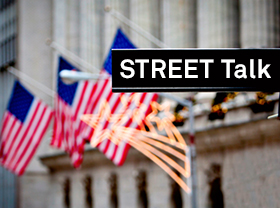Featured Topics
Featured Products
Events
S&P Global Offerings
Featured Topics
Featured Products
Events
S&P Global Offerings
Featured Topics
Featured Products
Events
S&P Global Offerings
Featured Topics
Featured Products
Events
Financial and Market intelligence
Fundamental & Alternative Datasets
Government & Defense
Professional Services
Banking & Capital Markets
Economy & Finance
Energy Transition & Sustainability
Technology & Innovation
Podcasts & Newsletters
Financial and Market intelligence
Fundamental & Alternative Datasets
Government & Defense
Professional Services
Banking & Capital Markets
Economy & Finance
Energy Transition & Sustainability
Technology & Innovation
Podcasts & Newsletters
Research — Jan 09, 2025
"Street Talk" is a podcast hosted by S&P Global Market Intelligence that takes a deep dive into issues facing financial institutions and the investment community.
Listen on Apple Podcasts and Spotify.
Investors have flocked back to the bank group over the last five months as the fundamental environment has improved and the election results in November added legs to the rally.
In the latest Street Talk podcast, KBW CEO Tom Michaud discussed improving investor sentiment toward the bank space, his firm's expectation for US banks' earnings and credit quality in 2025 and 2026, and the outlook for capital raising and bank M&A activity.
The prospect of increased capital raising and M&A activity seems more likely as bank stock valuations have improved. Regional bank stocks have gained 20% this year, while the large cap bank index has jumped 40%. Michaud said in the podcast, recorded Dec. 12, that investors have warmed up to the bank group because the operating environment has improved after several challenging years when banks faced an inverted curve, fears of an economic slowdown, sharp increases in deposit costs and related net interest margin pressure.
Michaud said that while the yield curve remains flat, the pressure on deposits has eased. He said confidence in economic growth and the ability for the Fed to achieve a soft landing has grown while concerns over asset quality deterioration have declined. He noted that the commercial real estate blowout that some investors feared has not occurred. He said if it has not happened already, it is unlikely to happen, given the direction of interest rates and the reopening of the capital markets that will allow restructuring activity.
"That doesn't mean we won't have more commercial real estate losses. We will. But will we have the big event that folks are worried about? And I think each day that goes by, it gets less likely," Michaud said.
He further noted that the election has created more optimism about the banking sector and investors now expect a friendlier regulatory environment toward banks.
"There was a rally that had started in these stocks preelection. And I think it's because after two years of declining earnings because of the inverted yield curve, we were about to get relief," Michaud said.
For instance, he noted that EPS declined for banks in 2023 and 2024 but said KBW expects the banking industry to grow earnings by 6% in 2025 and by 12% in 2026, largely due to stronger net interest income.
The executive said large banks will also receive a boost from a rebound in global dealmaking activity. He said revenue estimates for investors are higher in 2025 than the reported levels in 2021, which marked the strongest period in the last decade. He said JPMorgan Chase & Co., Goldman Sachs Group Inc., Citigroup Inc. and Bank of America Corp. will all see a bounce in those businesses.
"We may have gone from an era of constantly cutting earnings estimates to going into a period where we start increasing bank estimates. And I think the delta surprise could be that growth in this economy is a little bit better than 4% loan growth," Michaud said.
Stronger growth could come as the M&A market rebounds, in part due to a more favorable regulatory environment. Michaud noted that banks waited 40% longer under the Biden administration than the prior Trump administration to receive a regulatory response to a merger application. The longer regulatory approval timelines increased uncertainty, which raised the stakes for any management teams considering consolidating. If that timeline shortens, would-be acquirers might feel more comfortable pursuing transactions.
The executive also noted that the reasons for bank consolidation remain in place, including the value of scale.
"I believe that scale works and scale works because the numbers show it works. If you look at banks by asset size, you will see that as they get larger, they typically get more profitable, unless they are gathering near a key regulatory attachment point, then they go back down before they go back up. We call it a game of shoots and ladders," Michaud said.
A pickup in bank M&A activity almost certainly would lead to increased capital raising as well. Michaud said that more than 50% of recent bank M&A activity has included a capital raise. He said banks will continue to build capital organically due to stronger earnings, but institutions are simply looking to strengthen their balance sheets.

.
This article was published by S&P Global Market Intelligence and not by S&P Global Ratings, which is a separately managed division of S&P Global.
